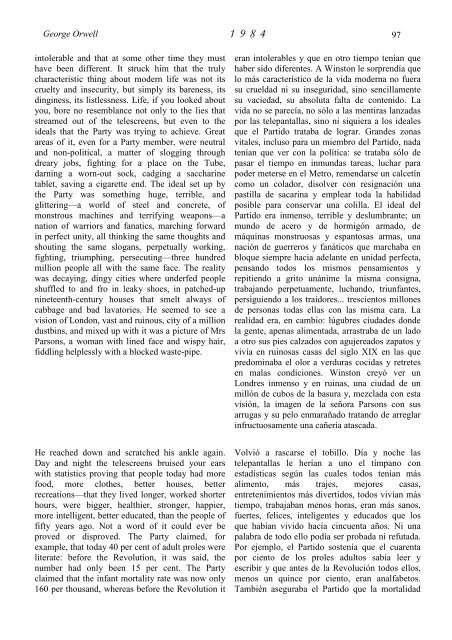Create successful ePaper yourself
Turn your PDF publications into a flip-book with our unique Google optimized e-Paper software.
George Orwell 1 9 8 4<br />
intolerable and that at some other time they must<br />
have been different. It struck him that the truly<br />
characteristic thing about modern life was not its<br />
cruelty and insecurity, but simply its bareness, its<br />
dinginess, its listlessness. Life, if you looked about<br />
you, bore no resemblance not only to the lies that<br />
streamed out of the telescreens, but even to the<br />
ideals that the Party was trying to achieve. Great<br />
areas of it, even for a Party member, were neutral<br />
and non-political, a matter of slogging through<br />
dreary jobs, fighting for a place on the Tube,<br />
darning a worn-out sock, cadging a saccharine<br />
tablet, saving a cigarette end. The ideal set up by<br />
the Party was something huge, terrible, and<br />
glittering—a world of steel and concrete, of<br />
monstrous machines and terrifying weapons—a<br />
nation of warriors and fanatics, marching forward<br />
in perfect unity, all thinking the same thoughts and<br />
shouting the same slogans, perpetually working,<br />
fighting, triumphing, persecuting—three hundred<br />
million people all with the same face. The reality<br />
was decaying, dingy cities where underfed people<br />
shuffled to and fro in leaky shoes, in patched-up<br />
nineteenth-century houses that smelt always of<br />
cabbage and bad lavatories. He seemed to see a<br />
vision of London, vast and ruinous, city of a million<br />
dustbins, and mixed up with it was a picture of Mrs<br />
Parsons, a woman with lined face and wispy hair,<br />
fiddling helplessly with a blocked waste-pipe.<br />
He reached down and scratched his ankle again.<br />
Day and night the telescreens bruised your ears<br />
with statistics proving that people today had more<br />
food, more clothes, better houses, better<br />
recreations—that they lived longer, worked shorter<br />
hours, were bigger, healthier, stronger, happier,<br />
more intelligent, better educated, than the people of<br />
fifty years ago. Not a word of it could ever be<br />
proved or disproved. The Party claimed, for<br />
example, that today 40 per cent of adult proles were<br />
literate: before the Revolution, it was said, the<br />
number had only been 15 per cent. The Party<br />
claimed that the infant mortality rate was now only<br />
160 per thousand, whereas before the Revolution it<br />
eran intolerables y que en otro tiempo tenían que<br />
haber sido diferentes. A Winston le sorprendía que<br />
lo más característico de la vida moderna no fuera<br />
su crueldad ni su inseguridad, sino sencillamente<br />
su vaciedad, su absoluta falta de contenido. La<br />
vida no se parecía, no sólo a las mentiras lanzadas<br />
por las telepantallas, sino ni siquiera a los ideales<br />
que el Partido trataba de lograr. Grandes zonas<br />
vitales, incluso para un miembro del Partido, nada<br />
tenían que ver con la política: se trataba sólo de<br />
pasar el tiempo en inmundas tareas, luchar para<br />
poder meterse en el Metro, remendarse un calcetín<br />
como un colador, disolver con resignación una<br />
pastilla de sacarina y emplear toda la habilidad<br />
posible para conservar una colilla. El ideal del<br />
Partido era inmenso, terrible y deslumbrante; un<br />
mundo de acero y de hormigón armado, de<br />
máquinas monstruosas y espantosas armas, una<br />
nación de guerreros y fanáticos que marchaba en<br />
bloque siempre hacia adelante en unidad perfecta,<br />
pensando todos los mismos pensamientos y<br />
repitiendo a grito unánime la misma consigna,<br />
trabajando perpetuamente, luchando, triunfantes,<br />
persiguiendo a los traidores... trescientos millones<br />
de personas todas ellas con las misma cara. La<br />
realidad era, en cambio: lúgubres ciudades donde<br />
la gente, apenas alimentada, arrastraba de un lado<br />
a otro sus pies calzados con agujereados zapatos y<br />
vivía en ruinosas casas del siglo XIX en las que<br />
predominaba el olor a verduras cocidas y retretes<br />
en malas condiciones. Winston creyó ver un<br />
Londres inmenso y en ruinas, una ciudad de un<br />
millón de cubos de la basura y, mezclada con esta<br />
visión, la imagen de la señora Parsons con sus<br />
arrugas y su pelo enmarañado tratando de arreglar<br />
infructuosamente una cañería atascada.<br />
Volvió a rascarse el tobillo. Día y noche las<br />
telepantallas le herían a uno el tímpano con<br />
estadísticas según las cuales todos tenían más<br />
alimento, más trajes, mejores casas,<br />
entretenimientos más divertidos, todos vivían más<br />
tiempo, trabajaban menos horas, eran más sanos,<br />
fuertes, felices, inteligentes y educados que los<br />
que habían vivido hacía cincuenta años. Ni una<br />
palabra de todo ello podía ser probada ni refutada.<br />
Por ejemplo, el Partido sostenía que el cuarenta<br />
por ciento de los proles adultos sabía leer y<br />
escribir y que antes de la Revolución todos ellos,<br />
menos un quince por ciento, eran analfabetos.<br />
También aseguraba el Partido que la mortalidad<br />
97


